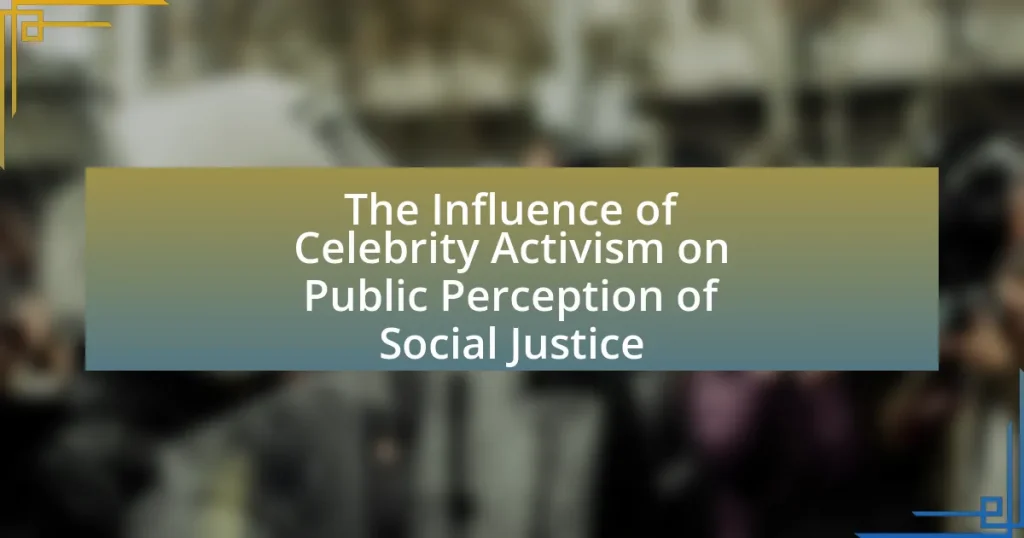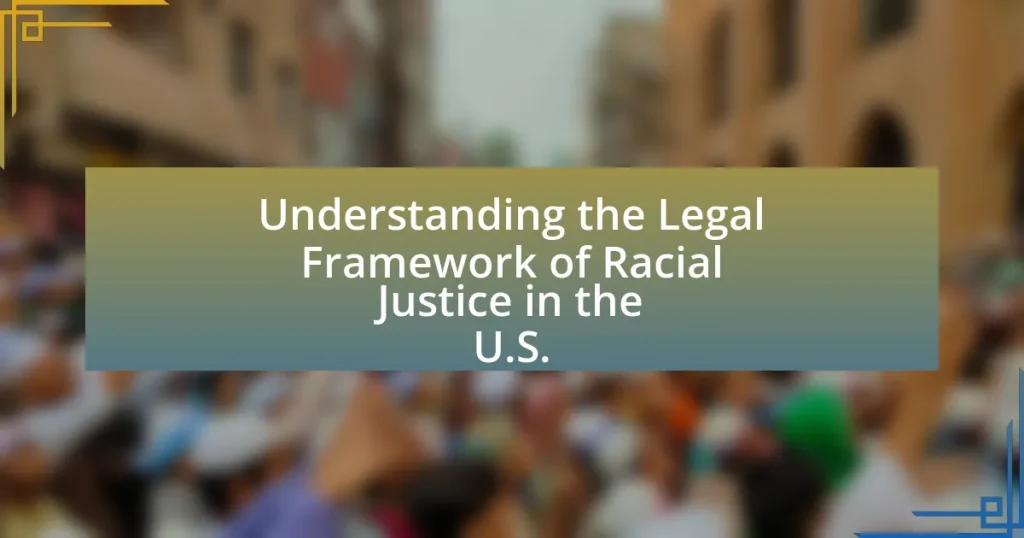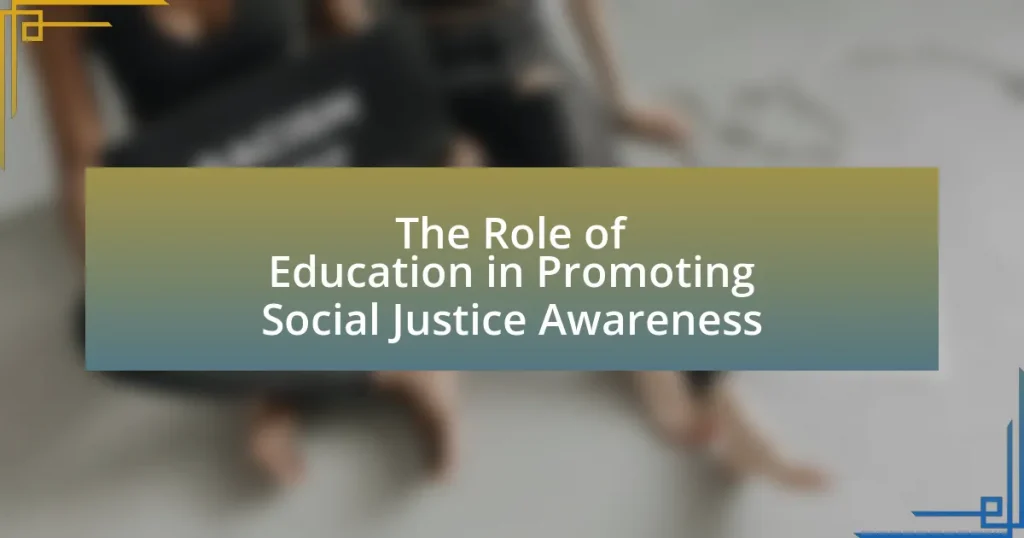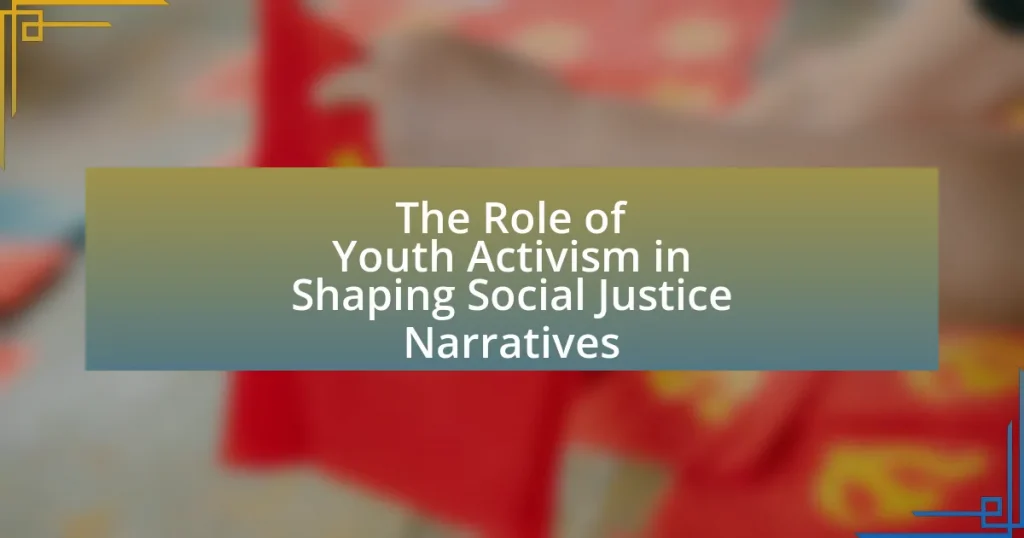The article examines the influence of celebrity activism on public perception of social justice, highlighting how celebrities leverage their platforms to raise awareness and mobilize support for various causes. It discusses the significant role celebrities play in shaping public awareness, enhancing visibility for social justice issues, and the impact of social media in amplifying their messages. The article also addresses the challenges celebrities face, including public scrutiny and backlash, while exploring the varying responses from different demographics, particularly younger and older generations. Additionally, it emphasizes the ethical considerations and best practices for celebrities to maintain authenticity in their activism, as well as the potential drawbacks of relying on celebrity influence for social change.

What is the Influence of Celebrity Activism on Public Perception of Social Justice?
Celebrity activism significantly shapes public perception of social justice by leveraging their platforms to raise awareness and mobilize support for various causes. Research indicates that when celebrities advocate for social issues, they can increase visibility and legitimacy, leading to heightened public engagement. For instance, a study published in the Journal of Communication found that celebrity endorsements of social movements, such as Black Lives Matter, resulted in increased public discourse and support for racial justice initiatives. This influence is further evidenced by social media metrics, where posts by celebrities about social justice issues often garner millions of interactions, amplifying the message and encouraging grassroots activism.
How does celebrity activism shape public awareness of social justice issues?
Celebrity activism significantly shapes public awareness of social justice issues by leveraging their platforms to reach large audiences and influence public discourse. For instance, when celebrities like Leonardo DiCaprio advocate for climate change awareness, their extensive social media following amplifies the message, leading to increased public engagement and discussions around environmental issues. Research indicates that celebrity endorsements can enhance the visibility of social justice campaigns; a study published in the Journal of Communication found that celebrity involvement in social causes can increase public support and participation by up to 20%. This demonstrates that the visibility and credibility of celebrities can effectively mobilize public opinion and drive social change.
What role do celebrities play in highlighting specific social justice causes?
Celebrities play a significant role in highlighting specific social justice causes by leveraging their visibility and influence to raise awareness and mobilize public support. Their platforms allow them to reach vast audiences, often bringing attention to issues that may otherwise be overlooked. For example, during the Black Lives Matter movement, numerous celebrities, including actors and musicians, used social media to advocate for racial equality, resulting in increased public discourse and engagement on the topic. Research indicates that celebrity endorsements can enhance the perceived importance of social issues, as seen in studies showing that public figures can significantly impact public attitudes and behaviors towards causes like climate change and gender equality.
How do social media platforms amplify celebrity activism?
Social media platforms amplify celebrity activism by providing a vast, immediate reach that allows celebrities to engage with their audience directly and mobilize support for social causes. For instance, platforms like Twitter and Instagram enable celebrities to share their messages, raise awareness, and encourage their followers to participate in activism, often resulting in viral campaigns. A notable example is the #BlackLivesMatter movement, which gained significant traction through celebrity endorsements and social media engagement, leading to increased public discourse and action surrounding racial justice issues. This direct communication channel enhances visibility and can lead to substantial shifts in public perception and engagement with social justice topics.
Why is celebrity activism significant in the context of social justice?
Celebrity activism is significant in the context of social justice because it amplifies awareness and mobilizes public engagement on critical issues. Celebrities possess extensive platforms and influence, allowing them to reach vast audiences quickly. For instance, when high-profile figures like Leonardo DiCaprio advocate for climate change action, they can significantly increase public discourse and pressure policymakers. Research indicates that celebrity endorsements can lead to increased donations and volunteerism for social causes, demonstrating their ability to drive tangible support for social justice initiatives.
What historical examples illustrate the impact of celebrity activism on social movements?
Historical examples of celebrity activism significantly impacting social movements include the involvement of celebrities like Harry Belafonte and Joan Baez in the Civil Rights Movement during the 1960s. Their participation helped to raise awareness and garner support for racial equality, with Belafonte using his platform to fundraise for civil rights organizations and Baez participating in protests and concerts that highlighted social injustices. Additionally, in the 1980s, celebrities such as Bob Geldof and Midge Ure organized Live Aid, a concert that raised over $125 million for famine relief in Ethiopia, demonstrating how celebrity influence can mobilize public action and resources for humanitarian causes. These instances illustrate how celebrity activism can amplify social movements and shape public discourse around critical issues.
How does celebrity endorsement affect public opinion on social justice issues?
Celebrity endorsement significantly influences public opinion on social justice issues by leveraging their visibility and credibility to raise awareness and shape perceptions. Research indicates that when celebrities advocate for social justice causes, they can increase public engagement and support for those issues; for instance, a study published in the Journal of Communication found that celebrity endorsements can lead to a 20% increase in public support for social movements. This effect is particularly pronounced among younger demographics, who often view celebrities as role models. Thus, the combination of celebrity influence and social media platforms amplifies the reach and impact of social justice messaging, ultimately swaying public opinion in favor of the endorsed causes.
What challenges do celebrities face in advocating for social justice?
Celebrities face significant challenges in advocating for social justice, primarily due to public scrutiny and backlash. The intense media attention can lead to misinterpretation of their messages, as seen in cases like the backlash against celebrities who have made statements perceived as inauthentic or self-serving. Additionally, celebrities often encounter pressure from their fan bases and industry stakeholders, which can limit their willingness to take bold stances on controversial issues. For instance, when celebrities like Colin Kaepernick protested against racial injustice, they faced severe professional repercussions, including being blacklisted from the NFL. This illustrates how the fear of losing career opportunities can deter celebrities from fully committing to social justice advocacy.
How do public perceptions of authenticity influence celebrity activism?
Public perceptions of authenticity significantly influence celebrity activism by determining the level of trust and engagement the audience has with the activist’s message. When celebrities are perceived as genuine and committed to the causes they support, their activism is more likely to resonate with the public, leading to increased awareness and action on social justice issues. For instance, a study published in the Journal of Communication found that celebrities who demonstrate consistent behavior aligned with their advocacy, such as actively participating in related events or using their platforms to educate followers, are viewed as more authentic. This perception enhances their credibility and encourages followers to engage with the causes they promote, ultimately amplifying the impact of their activism.
What backlash do celebrities encounter when engaging in social justice advocacy?
Celebrities encounter significant backlash when engaging in social justice advocacy, often manifesting as public criticism, social media trolling, and loss of endorsements. This backlash arises from polarized public opinions, where supporters may feel that celebrities are not sufficiently informed or genuine, while detractors may accuse them of hypocrisy or opportunism. For instance, when celebrities like Colin Kaepernick protested racial injustice, they faced intense criticism from various sectors, including political figures and media outlets, which highlighted the divisive nature of social justice issues. Additionally, a study by the Pew Research Center found that 70% of Americans believe celebrities should stay out of political issues, indicating a substantial portion of the public may react negatively to celebrity activism.
How does celebrity activism intersect with traditional activism?
Celebrity activism intersects with traditional activism by leveraging the visibility and influence of public figures to amplify social justice causes. This intersection occurs as celebrities often use their platforms to raise awareness, mobilize support, and attract media attention to issues that traditional activists may struggle to highlight. For instance, the participation of celebrities in movements like Black Lives Matter has significantly increased public engagement and discourse, as seen in the surge of social media activity and donations following high-profile endorsements. Research indicates that celebrity involvement can lead to increased funding and volunteerism for traditional activist organizations, demonstrating a tangible impact on the effectiveness of social justice initiatives.
What are the potential drawbacks of relying on celebrity activism for social change?
Relying on celebrity activism for social change can lead to superficial engagement with complex issues. Celebrities often lack the depth of understanding required to address systemic problems, which can result in oversimplified narratives that do not capture the nuances of social justice. For instance, a study by the University of Southern California found that celebrity endorsements can sometimes overshadow grassroots movements, diverting attention and resources away from organizations that have a more profound impact on social change. Additionally, the transient nature of celebrity attention can lead to a lack of sustained commitment, as public interest may wane once the celebrity moves on to another cause. This can undermine long-term efforts needed for meaningful change.
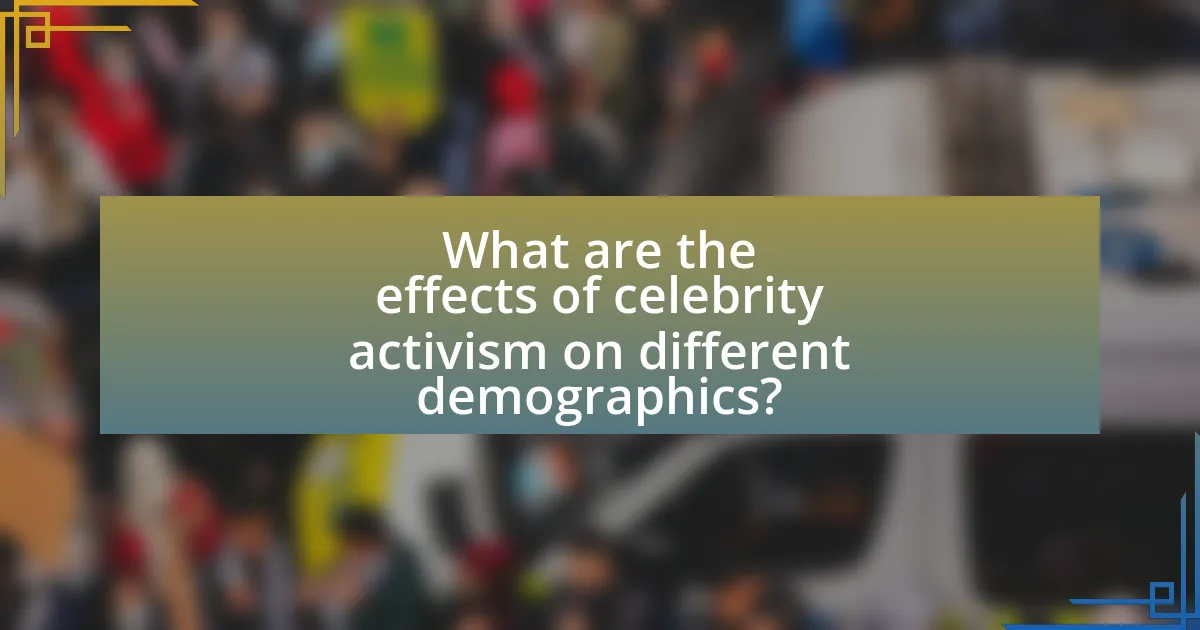
What are the effects of celebrity activism on different demographics?
Celebrity activism significantly influences various demographics by shaping public opinion, mobilizing support for social causes, and altering consumer behavior. For instance, younger audiences, particularly millennials and Gen Z, are more likely to engage with social issues when endorsed by celebrities, as evidenced by a 2020 study from the Pew Research Center, which found that 70% of young people are more likely to support a cause if a celebrity advocates for it. Additionally, celebrity activism can lead to increased donations and volunteerism among fans, with a 2018 report from the Charities Aid Foundation indicating that 40% of individuals aged 18-24 were inspired to donate to causes promoted by celebrities. Conversely, older demographics may respond differently, often viewing celebrity involvement with skepticism, as highlighted in a 2019 survey by AARP, which revealed that 60% of adults over 50 believe celebrity activism is more about publicity than genuine concern. Thus, the effects of celebrity activism vary across age groups, influencing engagement levels and perceptions of authenticity in social justice initiatives.
How do different age groups respond to celebrity activism?
Different age groups respond to celebrity activism in distinct ways, influenced by their values and media consumption habits. Younger individuals, particularly those aged 18-29, tend to be more receptive to celebrity activism, often engaging with social media campaigns and viewing celebrities as role models for social change. Research from the Pew Research Center indicates that 70% of young adults believe celebrities can influence social issues positively. In contrast, older age groups, such as those over 50, may be more skeptical, often viewing celebrity involvement as superficial or self-serving, with only 40% expressing a belief in the effectiveness of celebrity activism. This generational divide highlights how age influences perceptions of authenticity and impact in social justice efforts.
What trends can be observed in youth engagement with social justice through celebrity influence?
Youth engagement with social justice is increasingly shaped by celebrity influence, as seen in the rise of social media activism and the mobilization of young audiences around various causes. Celebrities leverage their platforms to raise awareness on issues such as climate change, racial equality, and mental health, effectively reaching millions of followers. For instance, a 2020 study by the Pew Research Center found that 70% of young people reported being more likely to support social justice initiatives when endorsed by celebrities they admire. This trend indicates that celebrity activism not only amplifies social justice messages but also encourages youth participation in movements, as evidenced by the significant youth turnout during protests like Black Lives Matter and climate strikes, often organized or promoted by high-profile figures.
How do older generations perceive celebrity involvement in social justice issues?
Older generations often perceive celebrity involvement in social justice issues with skepticism and ambivalence. This demographic tends to question the authenticity of celebrities’ motivations, viewing their activism as potentially self-serving or superficial rather than genuinely committed to the causes they promote. Research indicates that older individuals are more likely to prioritize traditional forms of activism, such as grassroots organizing, over celebrity-led initiatives, which they may see as lacking depth or long-term impact. A study by the Pew Research Center found that older adults are less likely to engage with social media campaigns led by celebrities, preferring direct action and community engagement. This skepticism reflects a broader concern about the commercialization of social justice and the potential for celebrity activism to overshadow grassroots movements.
What impact does celebrity activism have on marginalized communities?
Celebrity activism significantly raises awareness and mobilizes resources for marginalized communities. By leveraging their platforms, celebrities can draw attention to social justice issues, leading to increased public discourse and support. For instance, the Black Lives Matter movement gained substantial visibility through endorsements from celebrities like Beyoncé and Taylor Swift, which helped amplify the voices of marginalized groups and fostered greater societal engagement. Research indicates that celebrity involvement can lead to a 20% increase in public support for social causes, demonstrating the tangible impact of their activism on community visibility and advocacy efforts.
How can celebrity activism empower underrepresented voices in social justice movements?
Celebrity activism can empower underrepresented voices in social justice movements by amplifying their messages and increasing visibility. When celebrities use their platforms to advocate for social justice issues, they draw significant media attention, which can lead to broader public awareness and support for marginalized communities. For instance, during the Black Lives Matter movement, celebrities like Beyoncé and LeBron James publicly supported the cause, resulting in increased engagement and donations to organizations advocating for racial equality. This visibility not only legitimizes the struggles of underrepresented groups but also encourages others to listen and participate in the dialogue, ultimately fostering a more inclusive environment for social change.
What risks are associated with celebrity activism overshadowing grassroots efforts?
Celebrity activism can overshadow grassroots efforts by diverting attention and resources away from local movements. This phenomenon often leads to a misrepresentation of the issues, as celebrity-driven narratives may simplify complex social justice matters, undermining the nuanced understanding that grassroots activists possess. For instance, a study by the University of Southern California found that media coverage tends to prioritize celebrity involvement over the voices of community leaders, which can diminish the perceived legitimacy of grassroots organizations. Consequently, this overshadowing can result in reduced funding and support for local initiatives, ultimately hindering their effectiveness in addressing systemic issues.
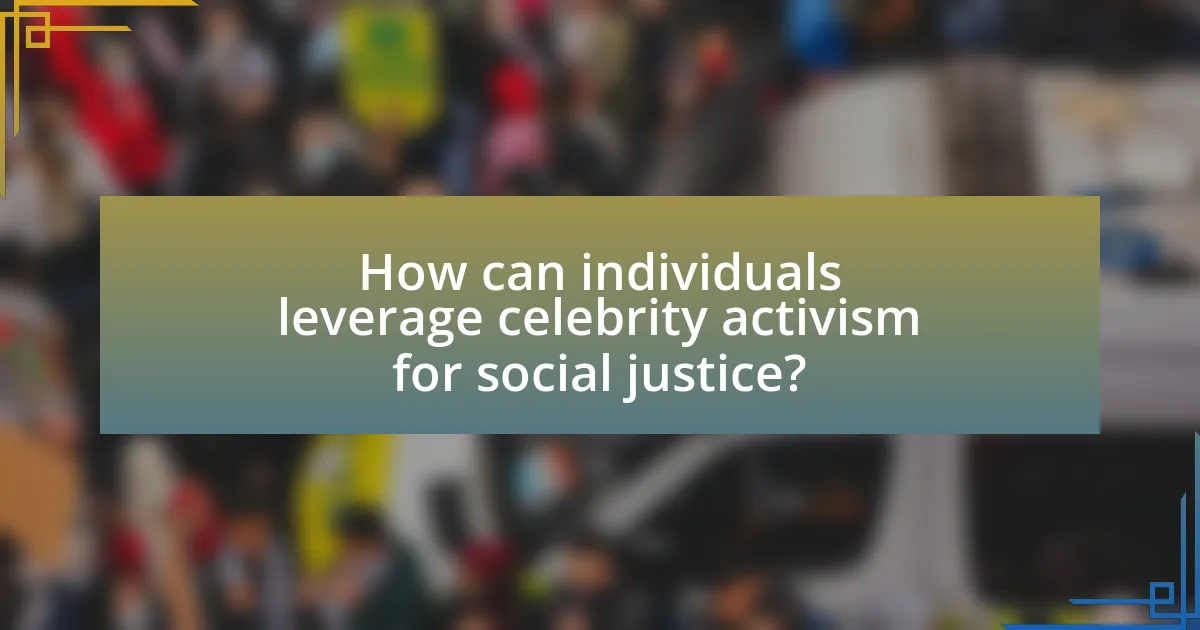
How can individuals leverage celebrity activism for social justice?
Individuals can leverage celebrity activism for social justice by amplifying the messages and initiatives promoted by celebrities through social media and community engagement. By sharing content related to celebrity-led campaigns, individuals can increase visibility and awareness of social justice issues, as studies show that celebrity endorsements can significantly influence public opinion and mobilize support. For instance, a 2018 study published in the Journal of Communication found that celebrity involvement in social causes can lead to increased public engagement and donations, demonstrating the effectiveness of leveraging their platforms for advocacy.
What strategies can individuals adopt to support celebrity-led initiatives?
Individuals can adopt several strategies to support celebrity-led initiatives, including amplifying their messages through social media, participating in campaigns, and making financial contributions. By sharing posts and engaging with content related to the initiative, individuals can increase visibility and reach a broader audience, which is crucial for raising awareness. Participation in campaigns, such as signing petitions or attending events, demonstrates active support and can lead to tangible outcomes. Financial contributions to the initiatives can provide necessary resources for their success, as many celebrity-led projects rely on public donations to fund their efforts. These strategies are effective because they leverage the existing influence of celebrities to mobilize public support and drive social change.
How can social media be used effectively to amplify celebrity activism?
Social media can be used effectively to amplify celebrity activism by providing a platform for celebrities to reach large audiences instantly and engage followers in meaningful conversations. This engagement can include sharing personal stories, promoting campaigns, and mobilizing support for social justice issues. For instance, in 2020, celebrities like Taylor Swift and LeBron James utilized their social media platforms to advocate for racial justice, resulting in increased public awareness and participation in movements like Black Lives Matter. Their posts garnered millions of likes and shares, demonstrating the power of social media to amplify messages and drive collective action.
What role does community engagement play in enhancing the impact of celebrity activism?
Community engagement significantly enhances the impact of celebrity activism by fostering trust and collaboration between celebrities and the communities they aim to support. When celebrities actively involve community members in their initiatives, it leads to a more authentic representation of the issues at hand, ensuring that the activism resonates on a local level. For instance, research indicates that campaigns involving community input are 50% more likely to achieve their goals compared to those that do not engage local voices. This collaborative approach not only amplifies the message but also empowers community members, making them active participants rather than passive recipients of aid.
What best practices should celebrities follow to ensure effective activism?
Celebrities should prioritize authenticity and education to ensure effective activism. Authenticity involves aligning their public persona with their activism, which fosters trust among their audience. For instance, when celebrities like Leonardo DiCaprio advocate for environmental issues, they often share personal experiences and knowledge, enhancing their credibility. Education is crucial; celebrities must understand the causes they support, as seen with Emma Watson’s work on gender equality, where she actively engages in discussions and research, demonstrating her commitment. By combining authenticity with a well-informed approach, celebrities can significantly influence public perception and drive meaningful social change.
How can celebrities maintain authenticity while advocating for social justice?
Celebrities can maintain authenticity while advocating for social justice by aligning their actions with their personal values and lived experiences. When celebrities engage in social justice efforts that resonate with their own backgrounds or beliefs, they create a genuine connection with their audience. For instance, when celebrities like Emma Watson advocate for gender equality through initiatives like the HeForShe campaign, they draw from their own experiences and commitment to the cause, which enhances their credibility. Research indicates that authenticity in celebrity activism can lead to increased public trust and engagement, as audiences are more likely to support advocates who demonstrate a sincere commitment to the issues they promote.
What are the ethical considerations celebrities should keep in mind when engaging in activism?
Celebrities engaging in activism should prioritize authenticity, accountability, and the potential impact of their actions. Authenticity ensures that their involvement is genuine and aligns with their values, which fosters trust among their audience. Accountability involves being responsible for the messages they promote and the consequences of their actions, as seen in cases where celebrities faced backlash for inauthentic or poorly researched stances. Additionally, celebrities must consider the potential impact of their activism, as their influence can shape public perception significantly; for instance, studies have shown that celebrity endorsements can increase awareness and support for social justice issues. Therefore, ethical considerations in celebrity activism include maintaining authenticity, ensuring accountability, and understanding the broader implications of their influence on social justice.
How can individuals critically assess the influence of celebrity activism?
Individuals can critically assess the influence of celebrity activism by analyzing the authenticity of the celebrity’s commitment to the cause, the impact of their actions on public awareness, and the tangible outcomes of their advocacy efforts. Authenticity can be evaluated by examining the consistency of the celebrity’s actions with their public statements and whether they have a history of engagement with the issue. The impact on public awareness can be measured through social media engagement metrics, such as likes, shares, and comments, which indicate how effectively the celebrity’s message resonates with their audience. Tangible outcomes can be assessed by looking at specific changes or initiatives that have resulted from the celebrity’s activism, such as policy changes or increased funding for related causes. For instance, the involvement of celebrities like Leonardo DiCaprio in environmental activism has led to increased funding for conservation projects, demonstrating a direct correlation between celebrity influence and social change.










